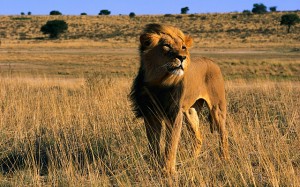 The ongoing struggle for lions to exist against the twin threats of poaching and a diminishing habitation has been brought to international attention through two films – The Last Lions and African Cats. The Last Lions is a National Geographic production which addresses the sobering statistic that there are roughly only 20,000 lions left in the wild in Africa. To put this into perspective, 50 years ago the numbers were close to 500,000, so today’s figure of 20,000 represents a horrifying drop in numbers of approximately 96% – the main cause of the decline in numbers being due to poaching activity. Filmmakers Dereck and Beverly Joubert are passionate on the subject and set out a very strong case to have lions protected by governmental and international accords in the same way that other endangered species such as the elephant are protected. The couple cite the fact that the eco-tourism industry benefits to the tune of billions of pounds each year which should bring with it the moral and financial imperative to protect the animals that tourists want and expect to see.
The ongoing struggle for lions to exist against the twin threats of poaching and a diminishing habitation has been brought to international attention through two films – The Last Lions and African Cats. The Last Lions is a National Geographic production which addresses the sobering statistic that there are roughly only 20,000 lions left in the wild in Africa. To put this into perspective, 50 years ago the numbers were close to 500,000, so today’s figure of 20,000 represents a horrifying drop in numbers of approximately 96% – the main cause of the decline in numbers being due to poaching activity. Filmmakers Dereck and Beverly Joubert are passionate on the subject and set out a very strong case to have lions protected by governmental and international accords in the same way that other endangered species such as the elephant are protected. The couple cite the fact that the eco-tourism industry benefits to the tune of billions of pounds each year which should bring with it the moral and financial imperative to protect the animals that tourists want and expect to see.
The Disney nature production African Cats is a sympathetic portrayal of the difficulties facing lions and other big cats and serves to raise awareness of the subject ![massai09_lg[1]-1 massai09 lg1 1 199x300 Kenya Using Ecotourism To Save Lions](http://QuestPointSolarSolutions.com/wp-content/uploads/2012/06/massai09_lg1-1-199x300.jpg) to a wider audience – especially among children (the film carries a U certificate). Both films underline the necessity and the urgency of the work currently being carried out at the Porini Camps in Kenya. Porini safari camps are at the spearhead of the conservation of wildlife. Interaction with local communities is crucial to their success. Porini lease farmland from the Maasai tribes in Kenya and allow the vegetation to recover from over grazing and farming and to become restored as part of the lions’ wider natural habitat. It’s a business model that benefits all parties. The Maasai are employed as wardens and guides as an alternative to farming: Porini safaris benefit from their wealth of local knowledge and tracking skills and the wildlife benefits as poaching is no longer financially attractive because the average wage earned at the camp is 5 times the national average.
to a wider audience – especially among children (the film carries a U certificate). Both films underline the necessity and the urgency of the work currently being carried out at the Porini Camps in Kenya. Porini safari camps are at the spearhead of the conservation of wildlife. Interaction with local communities is crucial to their success. Porini lease farmland from the Maasai tribes in Kenya and allow the vegetation to recover from over grazing and farming and to become restored as part of the lions’ wider natural habitat. It’s a business model that benefits all parties. The Maasai are employed as wardens and guides as an alternative to farming: Porini safaris benefit from their wealth of local knowledge and tracking skills and the wildlife benefits as poaching is no longer financially attractive because the average wage earned at the camp is 5 times the national average.
Restoring land to its natural state is just part of the conservation work Porini is committed to. Visitors to the camps wanting to contribute to the safeguarding of the area and its wildlife for the future have the unique opportunity of some hands on conservation work.
